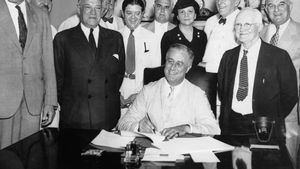Photo: Judy Garland Live: Comes Once in a Lifetime from Oct. 13, 1961 | Via YouTube
In spite of cracks that were now showing up on the well-paved road to Liza's fame, I thought everything would be okay. I looked at my Liza, the brilliant and lovely young woman who, upon winning the Oscar for Cabaret, showed up a day later in my office with a basket of flowers three feet high. She needed help to put the huge arrangement on my desk, and then came the best part. She handed me a card that said 'We did it.' I truly cared about Liza and I believed in her. Although I knew that her voice was not as good as her mother's or Barbra's, she worked hard, very hard, to win over audiences, and her quirkiness, her "please love me" desperation seduced them wherever we went. She was a good actress, and a great entertainer. I had enough confidence in her ability and in my own to imagine that together we could build a successful independent production company of our own. I believed that I knew how to turn her great success into greater profitability, how to make the deals work for her, how to make it all happen for the both of us. And if we worked closely together, I thought I could keep her straight. Boy, was I wrong!
It would start with a simple three or four picture deal tied to one of the studios. I spoke to Li about it with great enthusiasm. She got excited too and agreed that it was the way to go. And so, after fifteen years, I resigned from CMA. I told my lawyer to prepare an agreement with Liza. I had one foot out the door, and I was very excited about the future, truly looking forward to a new kind of professional independence. That's when I got the call.
It was from a man whose name I had only ever heard just in passing: Mickey Rudin, a powerful entertainment attorney in Los Angeles who was known as Frank Sinatra's mouthpiece. It was he who answered the questions about Sinatra's gambling interests and acquaintances with underworld figures. In dispatching me, he was nothing if not totally direct; brutal is more like it: "Liza will no longer require your services!" And he hung up. It took him 15 seconds to relieve me of everything it had taken me 15 years to build. I started to get nauseous, thought I would throw up, and the hand holding the phone shook so hard I almost dropped it. My body temperature dropped, like in the old days with Judy. My hands were freezing. I couldn't focus. I couldn't make myself move. I just sat there. I was in shock.
Hardest to accept was that none of this could have gone down if Liza hadn't wanted it to. I kept repeating this to myself like a mantra. It was Li's decision. But while my head knew this was true; my heart didn't want it to be. We had won the Triple Crown. And for this I was fired, summarily dismissed, a disgrace in the company? What heinous crime could my associates imagine I'd committed? Had Liza really considered all the ramifications of her decision? Did she even know what happened? Probably not. She was as self-absorbed as any other star. She was busy being in love again.
And where was Liza? Nowhere to be found! I knew she was in California. She had a new love in her life: Desi Arnaz, Jr. She was spending a lot of time with him and his family. I can't recall ever meeting him and I had had no inkling he would have such an impact on me. I didn't know how to reach him. I called Li's father and all the people we knew in common; I left word for her all over the West Coast, but there was no return call. Liza knew how to disappear when she wanted to, and she never did it better than in the few months following my firing. Did she know that I was now out of work, that I was jobless, divorced and supporting two children? My physical shock lasted less than hour. The shock to my psyche lasted more than a year.
I finally heard -- 20 years later -- an explanation for my dismissal that rang true. A mutual friend of Liza's and mine told me that it was Desi's mother, the great Lucille Ball, the mother-in-law-to-be, who told Liza to dump me. She suggested to Li, firmly I suspect, that if Liza was going to be part of the family, using the family representative, Mickey Rudin, was the way to go. If, after all, Rudin was good enough to call the shots for her and Frank Sinatra, he was good enough for Liza. "Stevie who?" is what I imagine Ms. Ball asked. Perhaps Liza simply got tongue-tied. Perhaps Liza agreed. To Ms. Ball I was nobody. But back then, I was somebody who cared. Of course, every story has a footnote: both Lucille Ball and Frank Sinatra fired Mickey Rudin. But it was too late. Liza's career was now suffering.
Excerpted from 'Judy & Liza & Robert & Freddie & David & Sue & Me' a memoir by Stevie Phillips. Copyright (c) 2015 by the author and reprinted by permission of St. Martin's Press
Stevie Philips built an influential career as a talent agent and manager, becoming head of the theater and motion picture departments at top agency CMA (now ICM), where her A-list clients included Liza Minnelli, Robert Redford, Al Pacino, Paul Newman, David Bowie, Bob Fosse and Cat Stevens. In her second act, she became a theater producer, bringing The Best Little Whorehouse in Texas to Broadway, among other award-winning theater productions: (Doonesbury, Loose Ends, Nuts, Open Admissions). She lives in New York City.

























































































